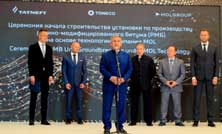MOL and Tatneft, one of the largest oil and gas companies in Russia, have launched a joint project for a rubber bitumen plant in the Republic of Tatarstan. The companies are also forming a joint venture that, besides manufacturing and selling rubber bitumen, will also be authorised to market MOL’s technology license in the Commonwealth of Independent States. The investment is partly financed by the Hungarian Export Development Agency’s (HEPA) tender funding.
Péter Szijjártó, Minister of Foreign Affairs and Trade of Hungary, Rustam Minhihanov, President of the Republic of Tatarstan and Chairman of the Board of Directors of Tatneft, and Nail Maganov CEO of Tatneft and Member of the Board of Directors of Tatneft, officially launched the construction of the MOL and Tafneft’s joint rubber bitumen plant with a production capacity of about 20,000 tonnes/year. The investment will be housed by Tatneft’s Taneco refinery, which operates in the Republic of Tatarstan, in the town of Nizhnekamsk, about 1,000 km from Moscow.
Likewise, MOL and Taneco have also agreed to establish a joint venture, the RMB-RUSS LLC, in which MOL will have a 51% majority. The joint venture will be using MOL’s rubber bitumen technology to produce and sell rubber bitumen, and to market MOL’s technology license in the Commonwealth of Independent States. The plant in Tatarstan, as well as future investments in the region will utilise the proven rubber bitumen technology extensively tested at MOL’s refinery in Zalaegerszeg, and MOL will provide the knowledge and expertise to run the plant, in form of a license. The raw bitumen and rubber grind will be provided by Taneco, while the special modifier manufactured by MOL LUB will be supplied by MOL.
The project is also funded by the Hungarian Export Development Agency (HEPA) managed by the Ministry of Foreign Affairs and Trade, providing about 50% of the investment costs.
The cooperation is in line with MOL Group’s updated 2030+ Shape Tomorrow strategy, as the company sees the future in kickstarting the circular economy, and the rubber bitumen technology developed together with the University of Pannonia provides a great example for prolonging the life span of used products.
MOL and the University of Pannonia have developed environmentally friendly, high-quality rubber bitumen technology in the early 2000s. The technology produces a higher quality and greater durability product needing less maintenance and contains 15% of used rubber grit.
Meanwhile, besides sharing the technology, MOL Group will support the new Tatar unit with the actual operational experience of the rubber bitumen plant in Zalaegerszeg which has been operating since 2012.
The rubber bitumen plant in Nizhnekamsk is MOL Group’s first Downstream (hydrocarbon processing and trading business) cooperation in the Commonwealth of Independent States. The Hungarian corporation has been present in the region for several decades, but so far it has mainly carried out Upstream (hydrocarbon exploration and production) activities locally.

